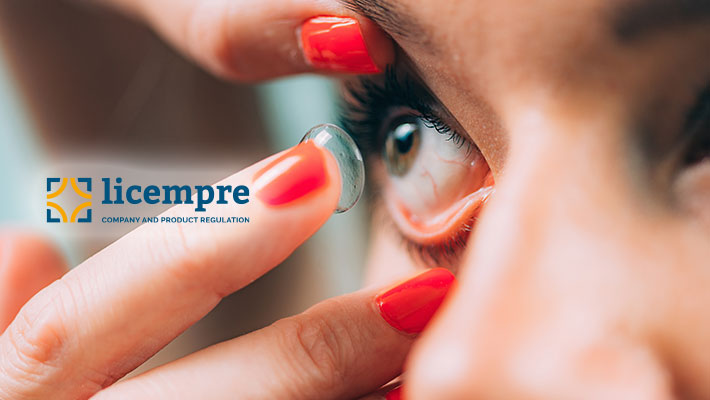
Contact lens are health products that need registration with Anvisa before being marketed. There are several brands and models of manufacture and all must follow the rules of Anvisa.
In this blog post, you will know how to register contact lens at Anvisa, and everything your company needs to do the registration in a practical, fast and safe way.
Good reading.
What are contact lens?

First, we must understand that contact lens are essential in most cases where patients are diagnosed with some type of vision problem.
The contact lens has the same function as glasses, which is to correct any vision problem, such as myopia, astigmatism, hyperopia, among others.
In many cases, patients prefer the use of the contact lens, in addition to glasses, most of the time for aesthetic reasons, as it does not appear.
The contact lens is a curved, transparent lens that fits on the surface of the eye, and can be rigid or gelatinous.
What is product registration?

Product registration is the documentation process at Anvisa that defines whether the product can be marketed according to Anvisa’s requirements. In this process, all documentation is collected and sent to the agency. In addition to the documentation, depending on the product, tests are carried out by specialized experts, evaluating all product information until it is approved for commercialization.
The product registration process at Anvisa varies according to the type of product; it is what we call the degree of risk. In this way, the product can be classified as risk class I, II, III and IV.
In the case of contact lens, there are two types: intraocular and extraocular.
Intraocular lens are made by implants, used by ophthalmologists on patients who need to replace the lens of the eye. The main function of intraocular lens is to focus light on the retina, as a normal eye does naturally, and that in these patients for some reason this has been lost.
Extraocular lens, are the most common lens that we talked about above to correct vision problems and that are placed superficially in the eyes.
Therefore, according to Anvisa, intraocular lens are classified as risk III and extraocular lens as risk II.
To learn more about Anvisa’s classification you can read the blog post:
How to register contact lens?

Now that you understand what contact lens are, let’s talk about how to register contact lens at Anvisa.
First, you need to know what type of lens. After that, it is necessary to request Anvisa to start the registration process. However, before that, it is necessary to know that the registration of any product can only be done if the company has AFE.
With the company registration up to date, the process can be started at Anvisa, with the collection of all product information for approval.
What is the Operating License?

The Operating License is the first step to register the product with Anvisa. Before registering the product, every company must acquire the Operating License obtained by the Health Surveillance.
The documentation is obtained after a technical visit to the site carried out by the Health Surveillance to confirm that the company has favorable operating conditions for such activity.
After acquiring the Operating License at Anvisa, the AFE is obtained.
Learn more how to register your company on our blog: https://www.licempre.com.br/como-registrar-sua-empresa-na-anvisa/
Do I need AFE to register contact lens at Anvisa?

The AFE – Autorização de Funcionamento de Empresa (Authorization for the Operation of a Company), is a certificate issued by Anvisa, indispensable in the registration process of any health product.
It is through this document that Anvisa proves that the company is able to perform the activities described in the certificate.
AFE is aimed at pharmacies, drugstores, companies of medicines and pharmaceutical supplies, including all companies that work with medical products, sanitizing products and cosmetics.
Why should I hire an adviser on regulatory matters?
We have seen the entire health product registration process so far and we must realize that the process can require complexity and bureaucracy. Advice on regulatory matters provides interested companies with a faster, safer and more effective service.
Often due to the lack of an experienced professional taking care of the process, the company may face errors, and consequently losses. Therefore, a specialized company guarantees more security and speed.
Do you want to know more about the benefits of hiring a regulatory advisory? Read our blog post: Why choose a regulatory affairs company.
If you want to know more about this and other subjects, also read our blog.


